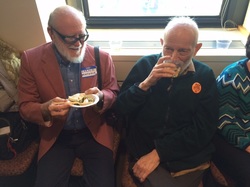 Harold Heatwole & Richard Levins Harold Heatwole & Richard Levins A few weeks ago, my father, ecologist Richard Levins, celebrated his 85th birthday with a symposium at the Harvard School of Public Health, called "The Truth is the Whole" at which dozens of scientists in a variety of fields spoke about their work, in many cases inspired, informed and shaped by his. There were many brilliant moments, many joyous reunions, a lot of shared memories and appreciations, and the highlights will soon be available online. But what I want to write about is a less than brilliant moment, after a long afternoon of men calling on each other, and ignoring the increasingly pissed off women in the room. It was one of those arguments that is low on content and high on posturing, about the best way to "resolve" climate change, and all the suggestions on the table were tiny, ineffective adjustments of one kind or another, because for those who are unable or unwilling to grasp the whole truth of climate change, that's all that's available. Weary from a day of overt sexism, I didn't jump in, but my brother Ricardo did, and spoke what I was thinking. Climate change is the inevitable outcome of capitalism. No amount of patching it up will make it sustainable. That doesn't mean we shouldn't encourage and applaud partial measures. But we shouldn't mistake them for solutions. 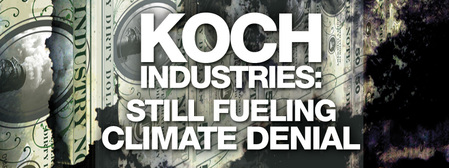 The real reason climate deniers are so adamant in their refusal to accept the evidence before us all, is that the realities of our unraveling ecosystem crack open the central myth of capitalism, that somehow it's possible to commit endless small and large acts of greed without any consequences; that through the mysterious power of "the market" all will be made well. Climate change is in-your-face proof that greed adds up to disaster, and to admit this would mean admitting that capitalism is a dangerous failure. For those whose universe revolves around the pursuit of profit, such an admission seems like the ultimate disaster, to be prevented at all cost, quite literally. 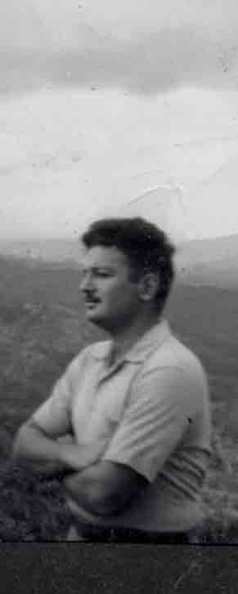 Richard Levins, 1954 Richard Levins, 1954 Among the many wise things my father has said in my presence over the last 61 years, the two that have become essential, weight bearing beams in the internal structures of my thinking are these: "There are no bad people, only bad choices," and, "The true job of a revolutionary is to change consciousness." It's not always easy to hold onto these truths when the water is rising along with the temperature, when the winds of urgency, blame, denial and despair are whipping around us, threatening to tear the roof off all our efforts. If, as I believe, bad choices are held in their rigid place by the unhealed accumulation of trauma, by scar tissue that restricts the natural flexibility of our imaginations to hopeless repetitions of the past; and if we are all at the mercy of bad choices by people with far too much power to do harm, then in spite of rising seas and heavy winds, this is the best possible time to make changing consciousness our number one priority. 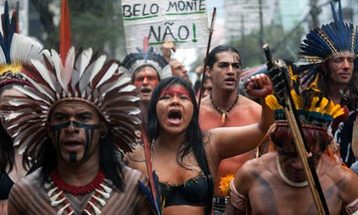 Indigenous Brazilians protesting Belo Monte dam project. Indigenous Brazilians protesting Belo Monte dam project. As Belgian ecosocialist Daniel Tanuro points out, for some people, for example, indigenous environmental activists, short term survival aligns well with the long term requirements of a sustainable world. Their local economies are tied to protection of their ecosystems. Small scale farming, fishing, and hunting, cultures based on intact rainforests and teeming rivers, are clearly incompatible with open pit mines, palm oil plantations, and giant dams. 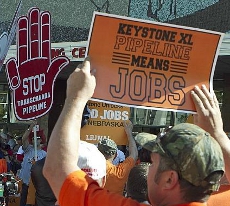 Pro-Keystone workers. Pro-Keystone workers. But for many labor movements, the short term goal of protecting jobs is pitted against the long term goal of a truly green economy, a society in which all human work support ecological balance, and organized workers can be mobilized against their own long term interests on the basis of short term fear and illusions that capitalism could still deliver what they need. 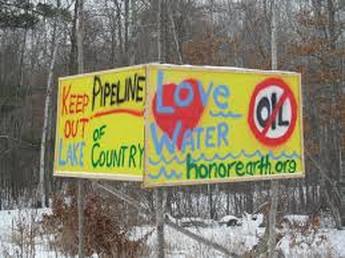 Against the pipeline in Northern Minnesota. Against the pipeline in Northern Minnesota. A dizzyingly accelerated concentration of wealth at the top, and decades of systematic, escalating assaults on workers' rights have led to a permanent state of deep economic anxiety, and while some of the hardest hit sectors, including US fast food workers and Mexican berry pickers, have responded with a renewed militancy, the overall impact on the labor movement has been toward smaller and smaller demands and greater accommodation to owning class greed. Imagination has become constricted to the point where hanging onto bad jobs seems more important than surviving as a species. So labor unions support construction of a crude oil pipeline through a pristine area of Northern Minnesota for the sake of 2500 temporary jobs, while indigenous leaders from White Earth Reservation and beyond protest the threat to wild rice harvests and fishing lakes, and join with other environmental activists warn of the danger to the Mississippi River headwaters. 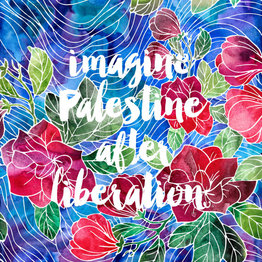 Many years ago, my friend Victor Lewis wrote that the most endangered natural resource on earth was the human imagination; that if the cure to cancer lay in the mind of a Brazilian street child, we were out of luck. Humankind has more than enough imagination to solve any number of problems, meet any number of challenges, invent whatever we need to invent. Our danger is that oppression crushes imagination. Our proposals need to awaken and free the dreaming power of all people, to speak to labor of the real jobs facing humanity, and craft transitions that take mortgages and pensions into account. It's important be clear and uncompromising in our opposition to the unjust and dangerous, but we need to make sure we propose more than we oppose. Opposition interrupts the usual. It opens up spaces through which new possibilities can emerge, if we plant them. 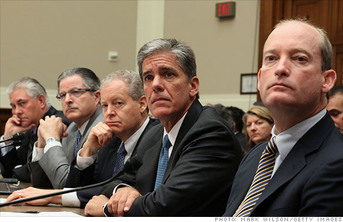 Oil company executives. Oil company executives. Those wounded people who are occupied by greed, who cannot feel their connection to the living earth or the human beings they harm, cannot imagine the end of capitalism offering them anything but devastating loss, horrifying retribution. And those of us whose wounds are of dispossession, of the looting of our lands, our peoples, our cultures, our bodies, who tremble with grief and rage, terror and weariness, who carry the weight of our defeats like blankets of lead, who are worn out by the endless struggle to just maintain, even when we work our hardest to plant good seed, raise healthy children, stand up for each other and ourselves--our hearts are also constricted, our imaginations half-caged. The work of organizing is all about imagination, and imagination is in trouble. 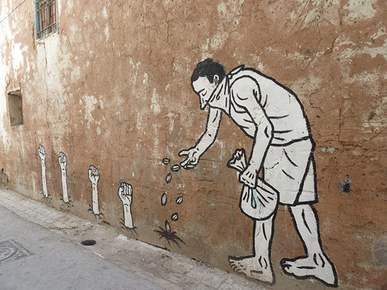 Tunisian political street art. Tunisian political street art. If the work of a revolutionary is to change consciousness, to create opportunities for better choices, then we need to be experts in cultivating resilience, experts in pushing back the reactive impulses of the traumatized, and making room to breathe. By every means in our collective power, we must call forth a healing and restorative justice that keeps mending the wounds of greed among both the ravaged and the ravagers. We must invent a culture of accountability and connection out of whatever is at hand, must all of us become storytellers of the other worlds that are possible. We must use each act of resistance, each teachable moment, each momentary mobilization, each unexpected win, each gesture of solidarity--use every possible, hopeful spark to reignite the creative power of people battered by discouragement into passive disbelief. And to do all this, we must honor, protect and support our revolutionary artists, specialists in the field of kindling dreams. 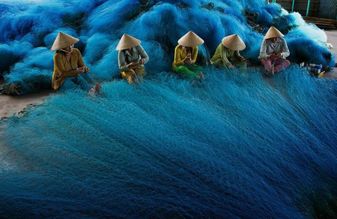 "FIshing Net Making in the Mekong Delta" by Do Tuyet Trinh, "FIshing Net Making in the Mekong Delta" by Do Tuyet Trinh, This is what I think about, night and day: how to reweave the living fabric of connection, so that more and more of us lose the protections of numbness, feel within ourselves and our world the consequences of corrupting greed, and can't stand them anymore; and so that more and more of us feel within ourselves and our world, the possible consequences of love, and want them more than we want righteous victimhood or revenge, more than fame or fortune or power over others, more than anything. This is why I do every single thing I do, why I write and speak, teach and mentor, dig up stories and pass them around. Greed rips through the world like giant sheers, severing bonds, tearing kinship apart, making humans we might have loved into commodities, making the wild, breathing world in all its beauty and power, nothing more than the raw materials of far away bank accounts. Nothing can save us but this, the hard work, that must be done together and by hand, of binding all our wounds, all these broken strands, into a safety net of new possibilities, big enough to hold the planet.
0 Comments
Your comment will be posted after it is approved.
Leave a Reply. |
About Aurora
Aurora Levins Morales is a disabled and chronically ill, community supported writer, historian, artist and activist. It takes a village to keep her blogs coming. To become part of the village it takes, donate here. Never miss a post!
Click below to add this blog to your favorite RSS reader: Archives
September 2017
Categories
All
|
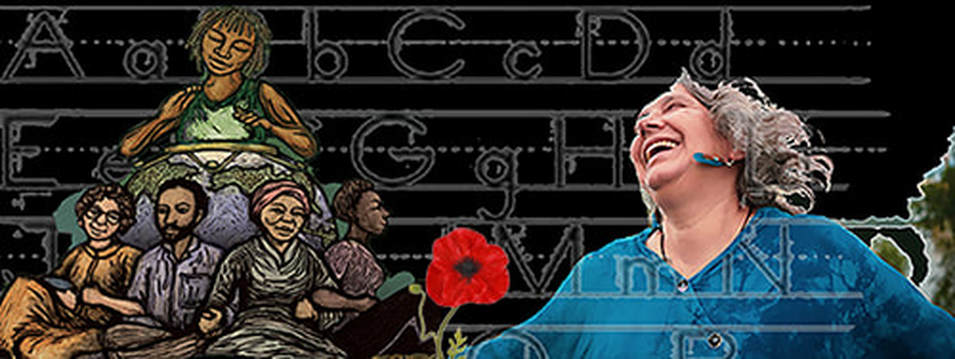
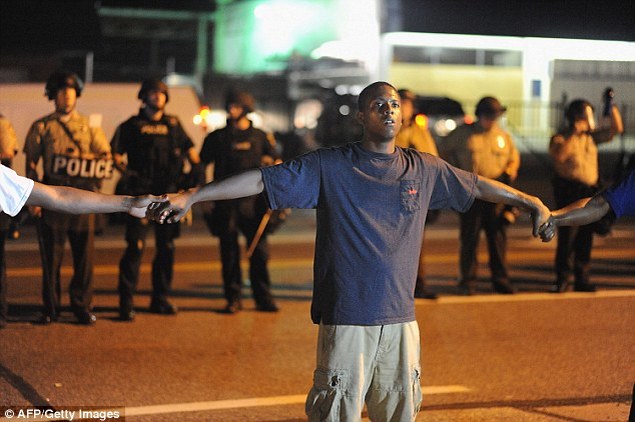
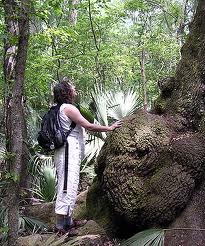
 RSS Feed
RSS Feed
